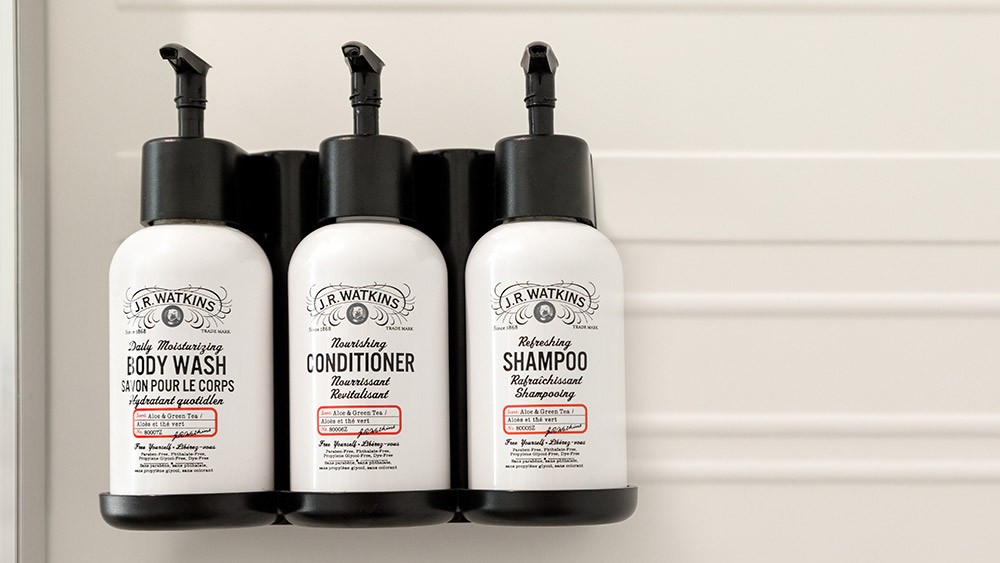InterContinental Hotels Group (IHG) joined Marriott and Disney in eliminating mini toiletries in favor of bulk-size products. The change will impact nearly all of IHG’s 843,000 guest rooms worldwide.
The move is aimed at reducing plastic waste at IHG’s properties and is scheduled to be completed in 2021.
In October 2018, IHG embraced the growing plastic straw ban and announced it would remove all single-use plastic straws from its hotels globally by the end of 2019.
“It’s more important than ever that companies challenge themselves to operate responsibly. We know it’s what our guests, owners, colleagues, investors and suppliers rightly expect,” said IHG CEO Keith Barr in an announcement of the transition.
“Switching to larger-size amenities across more than 5,600 hotels around the world is a big step in the right direction and will allow us to significantly reduce our waste footprint and environmental impact as we make the change,” he added.
“We’ve already made great strides in this area, with almost a third of our estate already adopting the change, and we’re proud to lead our industry by making this a brand standard for every single IHG hotel,” Barr continued. “We’re passionate about sustainability and we’ll continue to explore ways to make a positive difference to the environment.”
Measuring the Impact of IHG's Mini Toiletry Ban
IHG said it has an average of 200 million mini toiletries in use annually across the chain, which includes the following brands:
- Six Senses Hotels Resorts Spas
- Regent Hotels & Resorts
- InterContinental Hotels & Resorts
- Kimpton Hotels & Restaurants
- Hotel Indigo
- EVEN Hotels
- HUALUXE Hotels and Resorts
- Crowne Plaza Hotels & Resorts
- voco Hotels
- Holiday Inn, Holiday Inn Express and Holiday Inn Resort
- Holiday Inn Club Vacations
- avid hotels
- Staybridge Suites
- Candlewood Suites
While the new initiative to eliminate mini toiletries is a global undertaking, IHG offered examples of bulk-size amenities already being used at several of its brands. Six Senses Hotels Resorts Spas offers bathroom products in refillable ceramic dispensers across its entire portfolio, while Kimpton Hotels & Restaurants is already moving to larger-size amenities.
Voco Hotels, EVEN Hotels and avid hotels have all offered bulk-size amenities since their launches, working closely with suppliers to offer high quality dispensers and products.
More than 1,000 Holiday Inn Express hotels in the Americas have already been implementing the change, alongside a number of Staybridge Suites and Candlewood Suites properties.
California Bill Could Prohibit Mini Toiletries in Hotel Rooms
Disney and Marriott International have already made the move to eliminate mini toiletries. Additionally, a recent bill in the California State Assembly seeks to completely eliminate the use of small plastic bathroom amenity bottles at hotels in the name of sustainability.
If California Assembly Bill 1162 is enacted, after January 1, 2023, lodging establishments in the state with more than 50 guest accommodations would be prohibited from providing plastic bottles of less than 3 ounces that contain personal care products in any space within the guest room. Lodging establishments with 50 rooms or less would face a January 1, 2024, deadline.
Instead, shampoo, conditioner and soap—the only personal care products that would fall under the restriction—would be required to be offered from bulk dispensers.
[Related Article + Infographic: Avoiding Single-Use Plastic at Events]
In April 2018, Marriott International announced it would replace all plastic soap, shampoo and conditioner bottles with in-shower dispensers in all of the properties it owns.
The initiative is optional for franchisees.
According to Marriott, eliminating plastic mini toiletry bottles could save an average of 250 lbs. of plastic per year in a 140-room hotel, representing approximately 23,000 bottles. The hotel giant also noted it could save between $1,000 and $2,000 per year per hotel.
Marriott included the mini toiletries ban as part of its “Serve 360: Doing Good in Every Direction” effort, which aims to greatly reduce the chain’s environmental impact in order to reach its 2025 Sustainability and Social Impact Goals initiative.
Marriott has also pledged to remove all plastic straws by July 2019.
Other Marriott Serve 360 goals include:
- Reduce water intensity by 15%.
- Reduce carbon intensity by 30%.
- Reduce waste to landfill by 45%.
- Reduce food waste by 50%.
- Achieve a minimum of 30% renewable electricity use.
Meeting Planners React to Mini Toiletries Ban
The notion of eliminating plastic mini toiletries received mixed reactions from meeting professionals contacted by Meetings Today via The Meetings Community (MeCo) listserv.
 “I am finding more boutique and even some brand names moving away from mini toiletries,” said Rich Vallaster, director of client relations for Personify A2Z Events. “Disney has moved from single-use plastics to refillable mounted dispensers in their rooms and villas.
“I am finding more boutique and even some brand names moving away from mini toiletries,” said Rich Vallaster, director of client relations for Personify A2Z Events. “Disney has moved from single-use plastics to refillable mounted dispensers in their rooms and villas.
“On the Disney discussion boards, it was clear that [for] just as many who were upset they couldn’t take these mini souvenirs home, there were others who were thrilled with the reduction of waste contributed to the environment,” he added.
[Sustainability Pledges: Why Greenbuild Encourages Attendee Action]
“Sustainability is becoming of larger importance, especially for younger attendees, so this only makes sense,” Vallaster continued. “Nobody is forced to [use] what is used, and I am always surprised to see how many people bring their own for various reasons. To me, you are not taking anything away since hotels will still be providing the same amenities in different ways.”
Can In-Room Amenities Pose a Product-Tampering Risk?
Dianne Davis, owner of Broken Arrow, Oklahoma-based TulNet Meetings and Events, listed a number of concerns if plastic mini toiletries were to be banned.
- Tampering: Some people are really worried about this. They fear people will break into the larger containers and tamper with them. I get this. But I am not sure those mini toiletries are all that secure to begin with.
- Charitable Organizations: Organizations such a Clean the World, on a global basis, and homeless shelters, on a local level, have come to rely on these mini toiletries. I love that they put hygiene products in the hands of people who wouldn’t have access to them to begin with. What happens to these organizations who rely on these mini toiletries?
- Impact on Luxury Properties: There are those who see the dispensers as the equivalent of what is utilized at gyms, public showers, etc. Will the luxury-level guest be able to transition to a dispenser product?
- Guests/Attendees: It will be an education process. Otherwise, people will look at these dispensers as a budget option at a full-service property. I would want to inform attendees at least initially to best manage their expectations.
Steve Collins, Resort Meeting Source, echoed Davis’ product tampering concerns.
 “Personally, I would not use a bulk dispenser in a hotel,” Collins said.
“Personally, I would not use a bulk dispenser in a hotel,” Collins said.
“No matter how secure they try to make the closures, there is no telling WHAT someone might put into those dispensers,” he added. “After 30-plus years in the industry, I have seen FAR too many really gross things in hotel rooms to even consider it.”
Collins listed a number of hygiene risks that could contaminate virtually any guest room.
“I don't even use the water glasses unless they are plastic and wrapped,” he said. “Most of the time, I won't even use the in-room coffee maker for the same reason."
[Industry News: EIC Unveils New Sustainability Principles and a Pledge]
“And those ice buckets? NO WAY," Collins continued. “I have seen far too many used as vomit buckets. And, as much as hotels try to convince you they are somehow doing it for altruistic reasons, the real bottom line is … the bottom line.
“Bulk dispensers are far cheaper than single-serve bottles," he concluded.
Allergy Concerns With Bulk Toiletry Dispensers
Other meeting professionals noted that bulk toiletry dispensers could pose a risk for people with allergies.
 “It would be a problem for me because I am allergic to the fragrance in the products hotels provide in the mini toiletries,” said Anne Carey, a Chicago-based attendee engagement manager for BCD Meetings & Events.
“It would be a problem for me because I am allergic to the fragrance in the products hotels provide in the mini toiletries,” said Anne Carey, a Chicago-based attendee engagement manager for BCD Meetings & Events.
“I'm so sensitive that I normally ask the hotel to remove them from my room,” she added. “If they use dispensers in the shower, I wouldn't be able to have them removed.
“Depending on how strong the scent is or if the dispensers leak, I might not even be able to use the shower,” Carey said.
[Related Content: How the World's Largest Marriott Grows Its Own Produce]
 Beth Cooper-Zobott, director of conference services for Chicago-based Equity Residential, also lives with allergies that could be activated by improperly labeled bulk dispensers.
Beth Cooper-Zobott, director of conference services for Chicago-based Equity Residential, also lives with allergies that could be activated by improperly labeled bulk dispensers.
“I am allergic to iodine/sea salt,” she said. “Will ingredients of all products in dispensers be posted on them?
“I already travel with my preferred products,” Cooper-Zobott added. “I only use hotel products if I’ve run out of my own.”
California Assembly Bill 1162, at publication time, was winding through the legislation process.
What’s your opinion on the elimination of small plastic personal product bottles from hotel guest rooms? Take the poll and/or add your comments below!
Are you for or against a ban on small plastic hotel amenity bottles that contain shampoo, conditioner and soap? #hospitality #eventprofs #meetingprofs
— Meetings Today (@meetingstoday) May 30, 2019
Read more here: 🚿 https://t.co/MIt1qe9qv1 🚿
This article was originally published on May 30, 2019. It was updated on August 1, 2019.







